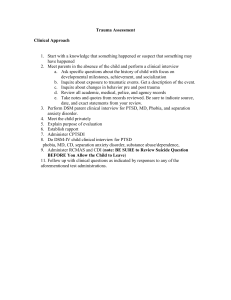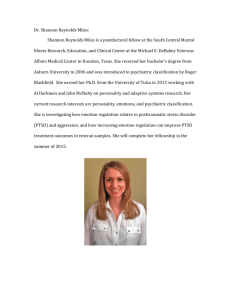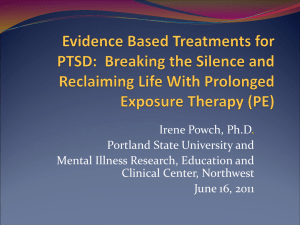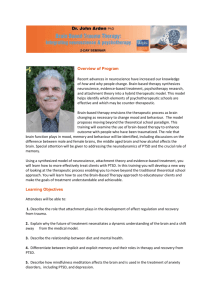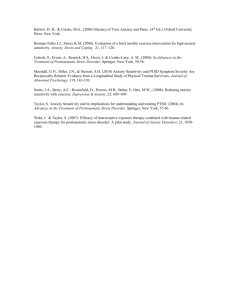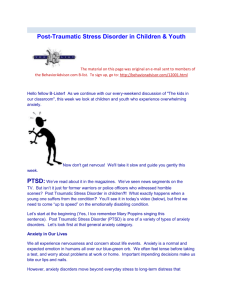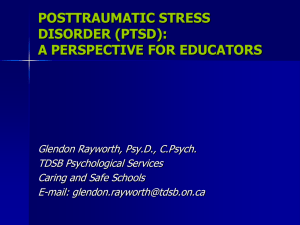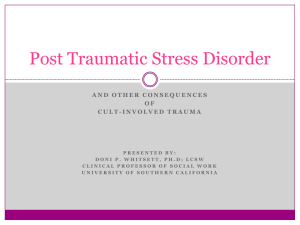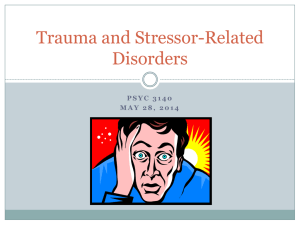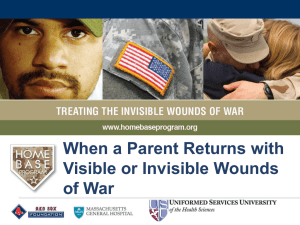Intensive Workshop in Prolonged Exposure Therapy for
advertisement
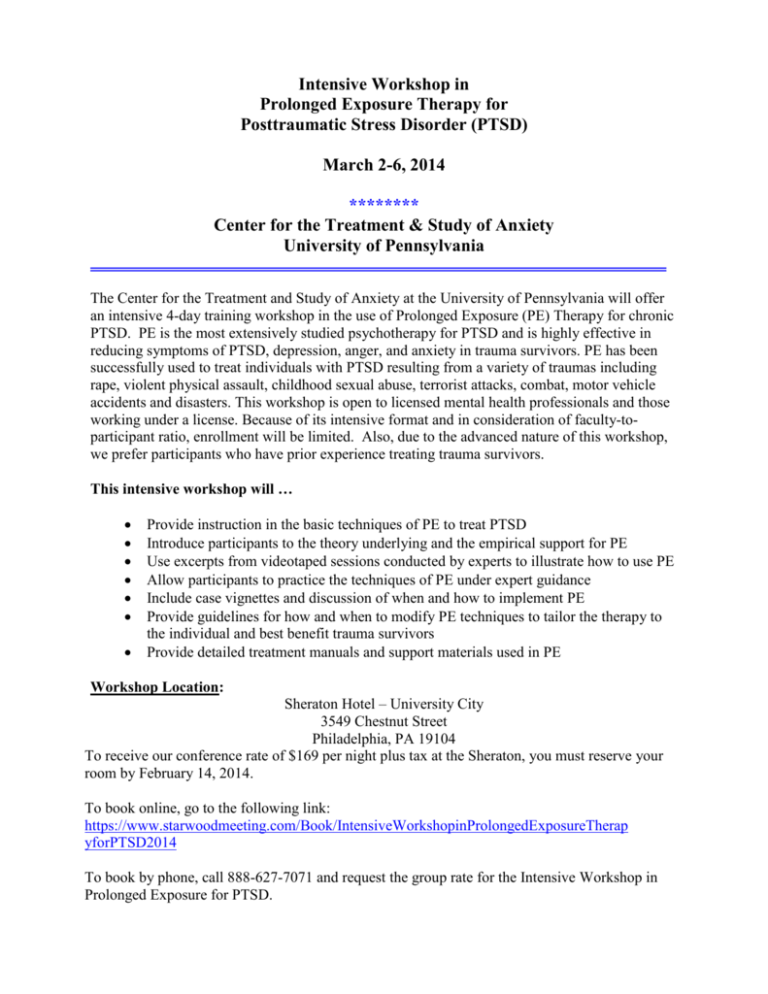
Intensive Workshop in Prolonged Exposure Therapy for Posttraumatic Stress Disorder (PTSD) March 2-6, 2014 ******** Center for the Treatment & Study of Anxiety University of Pennsylvania The Center for the Treatment and Study of Anxiety at the University of Pennsylvania will offer an intensive 4-day training workshop in the use of Prolonged Exposure (PE) Therapy for chronic PTSD. PE is the most extensively studied psychotherapy for PTSD and is highly effective in reducing symptoms of PTSD, depression, anger, and anxiety in trauma survivors. PE has been successfully used to treat individuals with PTSD resulting from a variety of traumas including rape, violent physical assault, childhood sexual abuse, terrorist attacks, combat, motor vehicle accidents and disasters. This workshop is open to licensed mental health professionals and those working under a license. Because of its intensive format and in consideration of faculty-toparticipant ratio, enrollment will be limited. Also, due to the advanced nature of this workshop, we prefer participants who have prior experience treating trauma survivors. This intensive workshop will … Provide instruction in the basic techniques of PE to treat PTSD Introduce participants to the theory underlying and the empirical support for PE Use excerpts from videotaped sessions conducted by experts to illustrate how to use PE Allow participants to practice the techniques of PE under expert guidance Include case vignettes and discussion of when and how to implement PE Provide guidelines for how and when to modify PE techniques to tailor the therapy to the individual and best benefit trauma survivors Provide detailed treatment manuals and support materials used in PE Workshop Location: Sheraton Hotel – University City 3549 Chestnut Street Philadelphia, PA 19104 To receive our conference rate of $169 per night plus tax at the Sheraton, you must reserve your room by February 14, 2014. To book online, go to the following link: https://www.starwoodmeeting.com/Book/IntensiveWorkshopinProlongedExposureTherap yforPTSD2014 To book by phone, call 888-627-7071 and request the group rate for the Intensive Workshop in Prolonged Exposure for PTSD. *********************** About Prolonged Exposure Therapy Chronic posttraumatic stress disorder (PTSD) is an often complex and challenging disorder for clinicians to treat. With a lifetime prevalence of 8% in the population, and in the aftermath of recent terrorist events in the US, it is likely that clinicians will continue to see a sizable number of clients with PTSD and other trauma-related pathology. Prolonged Exposure Therapy (PE) is … a theoretically-based and highly efficacious treatment for chronic PTSD empirically validated with more than 20 years of research supporting its use based on basic cognitive-behavioral principals a flexible therapy that can be modified to fit the needs of individual clients specifically designed to help clients process traumatic events and reduce trauma-induced psychological disturbances. A treatment that produces clinically significant improvement in about 80% of patients with chronic PTSD PE was developed by Edna Foa, Ph.D., Director of the Center for the Treatment and Study of Anxiety. Numerous well-controlled studies have shown that PE significantly reduces the symptoms of PTSD, depression, anger, and anxiety in trauma survivors. Practitioners throughout the United States and many foreign countries currently use PE to successfully treat survivors of varied traumas including rape, assault, child abuse, combat, motor vehicle accidents and disasters. PE has been beneficial for those suffering from co-occurring PTSD and substance abuse when combined with substance abuse treatment. Over years of testing and development, PE has evolved into an adaptable program of intervention to address the needs of varied trauma survivors. In addition to reducing symptoms of PTSD, PE instills confidence and a sense of mastery, improves various aspects of daily functioning, increases client’s ability to cope with courage rather than fearfulness when facing stress, and improves their ability to discriminate safe and unsafe situations. In 2001, Prolonged Exposure for PTSD received an Exemplary Substance Abuse Prevention Program Award from the U.S. Department of Health and Human Services Substance Abuse and Mental Health Services Administration (SAMHSA). PE was selected by SAMHSA and the Center for Substance Abuse Prevention as a Model Program for national dissemination. Intensive Training in Prolonged Exposure Therapy for PTSD March 3-6, 2014 ************* In this workshop, faculty from the Center for the Treatment & Study of Anxiety will provide intensive instruction in the use of Prolonged Exposure Therapy for survivors of trauma. This intensive workshop on how to implement Prolonged Exposure Therapy will begin with instruction in the basics of all components of PE. The second half of the workshop will focus on how to modify therapy procedures in order to tailor the treatment to the client’s response to exposure. Maintaining focus on treatment of PTSD while maintaining flexibility in following the manual will be emphasized. During this workshop, participants will be presented detailed case vignettes that illustrate use of PE in the treatment of trauma survivors with chronic PTSD. Participants will also see segments of videotaped therapy sessions conducted by experts that illustrate all PE therapy components. and will be given the opportunity to practice PE procedures with other attendees with feedback from faculty trainers. We will also provide detailed treatment manuals and supporting materials used in providing the therapy. At the end of this workshop, participants should be able to: Describe the diagnosis and psychopathology of PTSD Discuss emotional processing theory as it relates to Prolonged Exposure Therapy for PTSD Discuss empirically-supported, psychotherapeutic treatments for chronic PTSD and the comparative efficacy of these treatment approaches Explain how clients can be helped to emotionally engage in and process traumatic memories, with the aim of reducing trauma-related symptoms and difficulties Implement psychoeducational treatment components of Prolonged Exposure Therapy for PTSD Construct an in-vivo exposure hierarchy that includes a range of situations that safely and effectively promote learning while expanding the client’s world. Implement in-vivo exposure to safe but avoided trauma reminders with patients Help patients choose an appropriate index trauma to focus on in Prolonged Exposure Therapy for PTSD Conduct imaginal exposure to memories of traumatic events Choose hot spots with patients and implement hot spots procedures Identify and address avoidance in PE sessions Identify and address over- and under-engagement in imaginal exposure *Sample Workshop Agenda* Day 1 8:30 am – 9:00 Registration and continental breakfast 9:00 am – 10:30 Prolonged Exposure Therapy for PTSD Diagnosis of PTSD Theory and empirical support for cognitive behavioral treatment approaches 10:30 – 10:45 Break 10:45 – 12:30 Overview of Prolonged Exposure (PE) Therapy 12:30 – 1:30 Lunch on your own 1:30 – 3:00 Assessment of PTSD and other trauma-related psychopathology 3:00 – 3:15 Break 3:15 – 5:00 Instruction in the individual treatment components through description of intervention, videotapes of therapy sessions, role-plays among participants with observation and feedback from faculty Prolonged Exposure Therapy Program How to present the PE program to clients Establishing therapeutic alliance Breathing retraining Psychoeducation – common reactions to trauma Break into pairs to practice delivery of treatment overview/rationale 5:00 pm End Day 2 8:30 – 9:00 Check-in and continental breakfast 9:00 – 10:30 Imaginal Exposure Rationale for imaginal exposure (recounting the trauma) Procedure for imaginal exposure Videotape illustrations of progressive sessions of imaginal exposure 10:30 – 10:45 Break 10:45 – 12:30 Imaginal Exposure (con’t): Assignment of imaginal exposure homework Hot spot procedure for imaginal exposure Break into pairs to practice the procedures 12:30 – 1:30 Lunch on your own 1:30 – 3:00 In-Vivo Exposure Rationale for in-vivo exposure Use of Subjective Units of Distress Scale (SUDS) Break into pairs to practice these procedures 3:00 – 3:15 Break 3:15 – 5:00 In-vivo exposure (con’t): Construction of in-vivo hierarchy (approaching safe situations) Safety guidelines for in-vivo exposure Assignment of in-vivo homework Break into pairs to practice the procedures Day 3 8:30 – 9:00 Check-in and continental breakfast 9:00 – 10:30 Treatment components (continued): Final Session Reassessing SUDS for in-vivo hierarchy; discussion of what has changed; relapse prevention; planning on-going exposure work Final Session summaries – video illustrations Break into pairs to practice the procedures as needed 10:30 – 10:45 Break 10:45 – 12:30 Special issues: Case presentations (description and excerpts from videotaped sessions) illustrating procedural modifications, therapist response to client behavior: Avoidance - Reluctance to do in-vivo or imaginal exposure - Avoidance of homework (including listening to tapes) - Missing therapy sessions 12:30 – 1:30 Lunch on your own 1:30 – 5:00 Special issues (con’t): Maintaining focus on PTSD Anger Working with clients with co-morbid alcohol abuse/dependence Obstacles to homework compliance 3:00 – 3:15 Break 3:15 – 5:00 Procedural modifications of imaginal exposure in order to titrate emotional engagement: Over-engagement in exposure Day 4 8:30 – 9:00 Check-in and continental breakfast 9:00 – 10:30 Procedural modifications (con’t): Under-engagement in exposure 10:30 – 10:45 Break 10:45 – 12:00 Break into pairs to role-play exposure rationales, procedures, breathing training; observation and feedback from faculty 12:00 – 1:00 Lunch on your own 1:00 – 2:30 Important considerations in providing Prolonged Exposure therapy to trauma survivors 2:30 – 2:45 Break 2:45 – 4:00 Wrap-up Using the theoretical model of the treatment to guide therapists’ decision-making Developing tolerance for client’s emotional distress Flexibility in applying this treatment Importance of supervision and peer consultation How to begin using the therapy 60 vs. 90-minute therapy sessions Discussion period Suggested readings and literature Wrap-up and questions from participants Co-sponsored by: Philadelphia Behavior Therapy Association Who should attend: Licensed mental heath professionals or those working under a licensed mental health professional. Because of the advanced nature of this workshop and the limited enrollment, participants should have prior experience treating trauma survivors. Dates: Monday, March 3, 2014 – Thursday, March 6, 2014 Times: 9:00 am to 5:00 pm daily (8:30 am for check-in and continental breakfast) Cost: $1200.00 per person. This fee covers: The cost of workshop A therapist guide to PE: “Prolonged Exposure Therapy for PTSD: Emotional Processing of Traumatic Experiences” (Foa, Hembree, & Rothbaum, 2007), published by Oxford University Press A patient workbook for PE: “Reclaiming Your Life from a Traumatic Experience: Workbook” (Rothbaum, Foa, & Hembree, 2007), published by Oxford University Press A workshop binder which includes all handouts and supporting materials Continuing Education Credit: Philadelphia Behavior Therapy Association (PBTA) is approved by the American Psychological Association to provide continuing education credits for psychologists and Pennsylvania social workers. Other licensed professionals should confirm with their respective licensing boards that CE activities in compliance with the American Psychological Association’s standards for continuing education credits are acceptable. PBTA maintains responsibility for the program. This workshop is approved for 24 credit hours. In order to receive continuing education credits, participants must: attend each hour of the workshop (no late arrivals or early departures) sign in and out of the workshop each day complete a post-test and course evaluation pay $60 by cash or check to PBTA (payable at any time during the workshop) If all of these requirements are met, PBTA can provide you with a continuing education certificate at the conclusion of the workshop. About our Training Faculty Edna B. Foa, Ph.D. is a Professor of Clinical Psychology in Psychiatry at the University of Pennsylvania, where she serves as the Director of the Center for the Treatment and Study of Anxiety. She is an internationally renowned authority on the psychopathology and treatment of anxiety. Dr. Foa's career has been devoted to understanding anxiety disorders and the development of short-term, proven treatments for these disorders, including obsessive compulsive disorder (OCD) and post-traumatic stress disorder (PTSD). Her work has been highly influential among researchers and clinicians in the U.S. and abroad and she is an expert in the areas of post-traumatic stress disorders (PTSD) and obsessive-compulsive disorder (OCD). She has received numerous awards and distinctions, including The Distinguished Scientist Award from the American Psychological Association, and the TIME 100 Most Influential People for 2010. Dr. Foa has authored 20 books — some translated into multiple languages, including Spanish, German, Japanese and Chinese — and has published over 200 papers and book chapters. She has been honored for her contributions by the American Psychological Association, the Substance Abuse and Mental Health Services Administration (SAMHSA) and the Philadelphia Society of Clinical Psychologists. Dr. Foa received the Lifetime Achievement Award from the International Society for Traumatic Stress Studies and the Association for the Advancement of Behavior Therapy (ABCT). She is also the recipient of the Annual Signature Service Award from Women Organized Against Rape. Sandy Capaldi, Psy.D. is a licensed clinical psychologist at the Center for the Treatment and Study of Anxiety. She earned her doctorate in clinical psychology from Philadelphia College of Osteopathic Medicine after completing her internship at the Center for Brief Therapy in Philadelphia. Dr. Capaldi joined the CTSA in 2007 and serves as the coordinator for the Center’s PTSD training and practicum student training programs. Dr. Capaldi specializes in Prolonged Exposure Therapy (PE) for PTSD, Exposure and Response Prevention (EX/RP) for OCD, and cognitive-behavioral treatment for trichotillomania in children, adolescents, and adults. Other interests include cognitive-behavioral treatment of social anxiety, panic disorder, and specific phobias. Christina DiChiara, Psy.D. is a Postdoctoral Fellow at the Center for the Treatment and Study of Anxiety (CTSA) in the Perelman School of Medicine at the University of Pennsylvania. Dr. DiChiara received her bachelor’s degree from Villanova University. She received a master’s degree in Counseling and Clinical Health Psychology as well as her master’s and doctoral degrees in Clinical Psychology from the Philadelphia College of Osteopathic Medicine. Dr. DiChiara joined the CTSA in 2012 after the completion of her clinical internship at the Hudson Valley VA. Her professional interests include evidence-based treatments for anxiety disorders, with particular focus on posttraumatic stress disorder. Kelly N. Moore, Psy.D. is a post-doctoral fellow at the Center for the Treatment and Study of Anxiety in the Perelman School of Medicine at the University of Pennsylvania. She received her B.S. from Cornell University in 2002 and her M.Ed. from the University of Pennsylvania’s Graduate School of Education in 2003. After completing her pre-doctoral clinical internship at the University of Medicine and Dentistry of New Jersey, Dr. Moore received her Psy.D. in Clinical Psychology from The Graduate School of Applied and Professional Psychology at Rutgers University in 2011. Dr. Moore’s clinical interests include treatment of PTSD, dissemination of evidence based treatment to community populations, cultural competency, and program planning and evaluation. Elizabeth A. Ellis Ohr, Psy.D. is a clinical psychotherapist at the Center for the Treatment and Study of Anxiety at the University of Pennsylvania School of Medicine. She received her Psy.D. in clinical psychology from Immaculata University in 2009. Dr. Ellis Ohr joined the faculty while completing post doctoral training at the Children's Hospital of Philadelphia and the University of Pennsylvania Center for Treatment and Study of Anxiety. Her focus at the Center is on the treatment of all anxiety disorders. Carmen P. McLean, Ph.D. is an Assistant Professor of Clinical Psychology in Psychiatry at the Center for the Treatment and Study of Anxiety. Dr. McLean received her Bachelor's degree in psychology from the University of British Columbia and her Master's and Doctoral degrees in clinical psychology from the University of Nebraska at Lincoln. After completing her clinical internship at the University of Chicago Medical Center in 2008, Dr. McLean completed a postdoctoral fellowship at the National Center for PTSD at the Boston VA, where she conducted research on Web-based interventions for PTSD. Her current interests include gender effects in anxiety disorders, treatment augmentation, and novel treatment delivery methods. Steven Tsao, Ph.D. is a licensed clinical psychologist and serves as a clinical psychotherapist at the Center for the Treatment and Study of Anxiety at the Perelman School of Medicine of the University of Pennsylvania. Dr. Tsao completed his Ph.D. in clinical psychology at Fordham University, his predoctoral internship at the Boston VA Medical Center, and his postdoctoral fellowship at McLean Hospital. Dr. Tsao joined the CTSA after spending several years working at the OCD Institute at McLean Hospital, a residential treatment program for treatment-refractory OCD. Dr. Tsao was on the faculty at Harvard Medical School for six years, where he provided supervision and training on CBT, anxiety disorders, and eating disorders to psychology and psychiatry trainees. Dr. Tsao continues to supervise trainees and currently specializes in the treatment of anxiety disorders and eating disorders. Elna Yadin, Ph.D., a native of Israel, received her doctoral degree in physiological and experimental psychology at Bryn Mawr College in the U.S. in 1979. She spent 20 years studying the neuroscience of anxiety and relief mechanisms in the brain as it pertains to anxiety disorders and their treatment. She then specialized in clinical psychology and has been working at the Center for the Treatment and Study of Anxiety at the University of Pennsylvania since 1998, where she acts as the Director of the OCD Clinic and as the Foreign Visitor Liaison. As part of the team at CTSA, she has been treating patients with a variety of anxiety disorder and training and supervising professionals around the world in the implementation of evidence-based treatments for OCD and PTSD. Dr. Yadin is fluent in English and Hebrew. David A. Yusko, Psy.D. is the clinical director at the Center for the Treatment and Study of Anxiety in the Perelman School of Medicine at the University of Pennsylvania. He joined the faculty in 2006 after completing his doctoral internship at Montefiore Hospital in New York City. He received his Psy.D. in clinical psychology from the Graduate School of Applied and Professional Psychology at Rutgers University where his training specialized in cognitive behavioral treatments for addictive behaviors. Since joining the CTSA faculty, Dr. Yusko has extended his interest in addictions to the development of effective treatments for co-occurring posttraumatic stress disorder (PTSD) and substance use. He is also extensively trained in cognitive behavioral therapy for anxiety disorders; including exposure and response prevention therapy for OCD. Registration Information and Instructions: The registration form is found on the following page. Registration Deadline: For the March 2014 workshop, completed registration forms and payment must be received by February 14, 2014. Payments will be processed after that date. No refunds will be available after payment is processed. Instructions for Completing and Submitting Registration Form: Please complete the entire form and provide all information requested. Registration forms can be submitted: Via postal mail to: Sandy Capaldi, Psy.D. Center for the Treatment and Study of Anxiety Department of Psychiatry University of Pennsylvania 3535 Market Street, Suite 600 North Philadelphia, PA 19104-3309 Via fax to: 215-746-3311 Attn: Sandy Capaldi Via email as a Microsoft Word or PDF attachment to: sandraca@mail.med.upenn.edu Once your registration form is received, you will receive a confirmation via email. Please do not make travel or other arrangements until your registration is confirmed. Note that we can only reserve your space if you provide payment information or a check. Payment Information: Full payment of $1200 is due by February 14, 2014. Workshop fees are non-refundable after February 14, 2014. Please note that payments will not be processed until the due date of February 14, 2014. We accept checks, money orders, Discover, MasterCard, and Visa. Unfortunately, we do not accept American Express. If paying by check, please make check or money order payable to “CPUP”. Registration Form *All information is required* Intensive Workshop in Prolonged Exposure Therapy for PTSD March 3-6, 2014 Last Name: First Name: Work Agency: Profession and degree: License #: *If unlicensed, name of licensed supervisor: Work Address: City: Work Phone: Ext: Home Address: City: State: Zip: State: Zip: Email Address: Are you willing to have your name and email address listed in our PE provider database upon completion of the workshop? ___ Yes ___ No Briefly describe prior trauma treatment experience: Form of Payment -$1200.00 due by February 14, 2014 (Please note that payments will not be processed until the due date of February 14, 2014 and that workshop fees are non-refundable after this date.) Check Money Order *Please make check or money order payable to “CPUP” Credit Card Name as it appears on card: Card #: Type of card (Note: American Express not accepted) : Expiration Date: 3-Digit Security Code: *Please note: There is limited space available, so reserve your space early and avoid making travel or other arrangements until your registration is confirmed.
